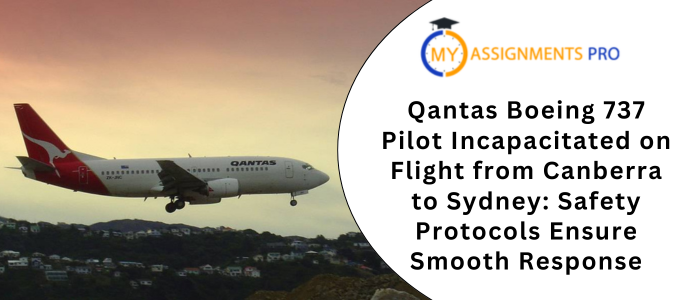
A recent domestic flight from Canberra to Sydney turned tense for the crew of Qantas flight QF804 when the trainee captain suddenly lost consciousness after landing. Thanks to Qantas’ strict safety protocols and the presence of an experienced check captain on board, the situation was managed calmly and professionally—ensuring all 113 passengers and eight crew members remained safe.
The medical emergency occurred on the evening of Tuesday, June 10, 2025, and involved a trainee captain undergoing routine flight operations training. Despite the scare, the aircraft was safely brought to its gate at Sydney Airport, and the affected pilot received immediate medical attention.
Incident Overview: Trainee Pilot Falls Ill After Landing
Qantas flight QF804, operated by a Boeing 737, had just completed its short route from Canberra (CBR) to Sydney (SYD)—a flight many Aussies take regularly. After a routine landing and while taxiing toward the terminal, the trainee captain advised the first officer that he was feeling unwell. Moments later, he lost consciousness after applying the aircraft's brakes.
Fortunately, as part of Qantas' standard pilot training, a supervising check captain was also in the cockpit. This additional senior pilot took over without delay and continued taxiing the aircraft safely to Terminal 3 at Sydney Airport around 7:00 PM.
Medical personnel were called to the gate and attended to the pilot onboard while passengers calmly disembarked.
ATSB Response and Safety Management
The Australian Transport Safety Bureau (ATSB) was promptly notified of what it called a "pilot incapacitation event." The bureau confirmed that although the event had been formally logged in their aviation safety database, a full investigation would not be conducted. The decision reflects that Qantas' internal protocols worked effectively and there was no broader safety concern.
A statement from the ATSB noted that “the aircraft landed safely and was taxied to the gate under the supervision of the remaining qualified pilots.” The fact that the aircraft had three licensed pilots in the cockpit—including the check captain—meant the situation was contained quickly and professionally.
Qantas Statement: Safety Comes First
In a statement following the event, a Qantas spokesperson reinforced the airline’s ongoing commitment to passenger and crew safety:
“The safety and well-being of our passengers and crew is our priority, and we’re supporting the individual following the incident.”
Due to privacy considerations, Qantas did not disclose the trainee pilot’s medical condition or the exact cause of the sudden illness.
A Second Incident in Three Months Raises Questions
This event is not the first of its kind for Qantas in recent months. A similar scare unfolded on March 10, 2025, aboard another Qantas Boeing 737. Flight QF505 was en route from Brisbane to Sydney when the captain began experiencing chest pains while the aircraft was still in the air.
As the plane was preparing to begin its descent, the captain reported feeling unwell. Quick-thinking cabin crew retrieved a defibrillator and entered the cockpit, ready to assist. Although defibrillator pads were applied to the pilot, the equipment was not activated. The captain remained conscious but was clearly in distress.
PAN Call Issued for Medical Priority Landing
The aircraft’s first officer took full control and issued a PAN call—short for "Possible Assistance Needed"—to Sydney Air Traffic Control. This call, while not as severe as a MAYDAY, signals that urgent assistance is required. The first officer's calm radio communication ensured immediate coordination for a priority approach to Runway 34R.
Air traffic control recordings revealed the professionalism of the crew under pressure. The aircraft was cleared to land without delay and touched down safely at approximately 9:00 AM local time.
Although the captain was still conscious after landing, he did not taxi the aircraft due to his condition. He was treated by waiting paramedics and transported to hospital for further evaluation.
Built-In Redundancy and Training Save the Day
Events like these highlight the importance of Qantas’ safety-first approach and comprehensive training procedures. All commercial flights operated by Qantas are staffed with highly trained pilots, and in training scenarios such as QF804, additional supervision is always present.
The Boeing 737’s cockpit allows for either pilot to fly and control the aircraft, but only the captain’s seat has full taxiing control, which is why the presence of the check captain on QF804 was vital.
In both recent incidents, Qantas crew members demonstrated poise, coordination, and professionalism, ensuring passengers were kept safe and largely unaware of the in-flight drama.
What Happens Next?
While the ATSB has decided not to launch a full investigation into the June 10 incident, the bureau has said it will continue to gather data and monitor trends in pilot health and safety incidents.
As the aviation sector globally continues to recover from the COVID-19 pandemic, pilot shortages and increased flying hours have become common. Medical events such as these—though rare—are being closely tracked by regulators and airlines alike.
Qantas, with its long-standing reputation as one of the world’s safest airlines, will likely review these events internally to reinforce protocols and ensure its crew remain fit for duty.
Final Thoughts: Confidence in Australia’s Aviation System
Australians can take comfort in knowing that our domestic air travel system is built with multiple layers of safety. From well-maintained aircraft and rigorous training to world-class air traffic control, incidents like those on QF804 and QF505 are handled with precision.
As passengers, we often only see the friendly cabin crew and the smooth take-off and landing—but behind the scenes, a complex system of checks, balances, and highly skilled professionals ensures that we arrive safely.
Both of these recent Qantas events serve as powerful reminders that while aviation incidents can occur, how they are handled makes all the difference. In both cases, proper protocols, teamwork, and calm responses ensured that passengers were never at risk.
Reliable and Affordable Assignment Help for Every Student
Struggling with deadlines or difficult coursework? My Assignments Pro offers expert assignment help to students across a variety of disciplines, including business, law, nursing, finance, and more. Our professional writers provide thoroughly researched, 100% original assignments tailored to your university’s standards. With quick turnaround times, budget-friendly rates, and exclusive discounts on bulk orders, getting high-quality assignment help has never been easier. Trust My Assignments Pro for dependable, professional assignment help that supports your academic success.
Source
Mitchell
Mitchell is a seasoned Ph.D. scholar with extensive expertise gained through years of rigorous research, publication, and teaching experience. He brings a wealth of knowledge and analytical skills to tackle complex academic challenges. His work is dedicated to delivering innovative solutions, advancing knowledge, and promoting academic excellence. Proficient in research methodology, data analysis, and scholarly writing, Mitchell has contributed to peer-reviewed journals and mentored students to achieve academic success.


